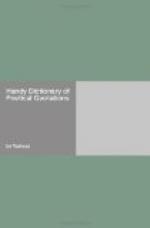Spirits when they please,
Can either sex assume, or both.
1650
MILTON: Par. Lost, Bk. i., Line 423.
=Sexton.=
See yonder maker of the dead man’s bed,
The sexton, hoary-headed chronicle!
Of hard, unmeaning face, down which ne’er stole
A gentle tear; with mattock in his hand,
Digs thro’ whole rows of kindred and acquaintance
By far his juniors! Scarce a skull’s cast
up
But well he knew its owner, and can tell
Some passage of his life.
1651
BLAIR: The Grave, Line 452.
His death, which happened in his berth,
At forty-odd befell:
They went and told the sexton, and
The sexton tolled the bell.
1652
HOOD: Faithless Sally Brown.
=Shadow.=
Shine out, fair sun, till I have bought a glass, That I may see my shadow as I pass. 1653 SHAKS.: Richard III., Act i., Sc. 2.
Syene, and where the shadow both way falls,
Meroe, Nilotic isle.
1654
MILTON: Par. Regained, Bk. iv., Line
70.
Our acts our angels are, or good or ill,
Our fatal shadows that walk by us still.
1655
JOHN FLETCHER: Upon an “Honest Man’s
Fortune."
=Shaft.=
In my school-days, when I had lost one shaft,
I shot his fellow of the selfsame flight
The selfsame way, with more advised watch,
To find the other forth; and by adventuring both
I oft found both.
1656
SHAKS.: M. of Venice, Act i., Sc. 1.
That eagle’s fate and mine are one,
Which on the shaft that made him die
Espied a feather of his own,
Wherewith he wont to soar so high.
1657
WALLER: To a Lady Singing a Song of his Composing.
=Shakespeare.=
Soul of the age!
Th’ applause! delight! the wonder of our stage!
My Shakespeare, rise! I will not lodge thee by
Chaucer, or Spenser, or bid Beaumont lie
A little further, to make thee room;
Thou art a monument, without a tomb,
And art alive still, while thy book doth live,
And we have wits to read, and praise to give.
1658
BEN JONSON: Underwoods, To the Mem. of Shakespeare.
There, Shakespeare, on whose forehead climb
The crowns o’ the world. Oh, eyes sublime,
With tears and laughters for all time!
1659
MRS. BROWNING: Vision of Poets, St. 101.
Or sweetest Shakespeare, Fancy’s child,
Warble his native wood-notes wild.
1660
MILTON: L’Allegro, Line 129.
What needs my Shakespeare for his honor’d bones,—
The labor of an age in piled stones?
Or that his hallow’d relics should be hid
Under a star-y-pointing pyramid?
Dear son of memory, great heir of fame,
What need’st thou such weak witness of thy name?
1661
MILTON: On Shakespeare.
=Shame.=
O, shame! where is thy blush?
1662
SHAKS.: Hamlet, Act iii., Sc. 4.




